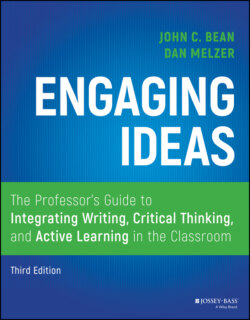| Kolb's Learning Style Phase | Corresponding Brain Cortex (Zull, 2002, 18) | Suggested Writing Assignments |
| Concrete experience phase. Learners are introduced to new concepts and issues through watching a film or demonstration, playing a game, doing field observations, and so forth. | Sensory cortex | Nongraded personal writing that records the learner's personal observations, thoughts, and feelings during the initial experience and that raises questions and expresses puzzlement |
| Reflective observation phase. Learners consider the concepts and issues again after doing readings, listening to lectures, participating in class discussions, and hearing different points of view. | Temporal integrative cortex | Personal exploratory writing, such as journal entries that allow the students to connect new material to their personal experiences and previous knowledgePersonal pieces based on autobiographical experiences with a topic or conceptPersonal reflection papers that encourage a questioning, open‐ended, thinking‐aloud‐on‐paper approach rather than thesis‐with‐support writing |
| Abstract conceptualization phase. Learners try to achieve abstract understanding of the concepts and issues by mastering and internalizing their components and seeing the relationship between new material and other concepts and issues. | Frontal integrative cortex | Formal academic projects calling for thesis‐based analyses and arguments |
| Active experimentation phase. Learners actively use the new concepts to solve problems by applying them to new situations. | Motor brain | Position papers based on cases that use the new conceptsWrite‐ups of a student's laboratory or field research using the conceptsProposals applying new concepts and knowledge to solve real‐world problemsCreative pieces demonstrating understanding of new material |
